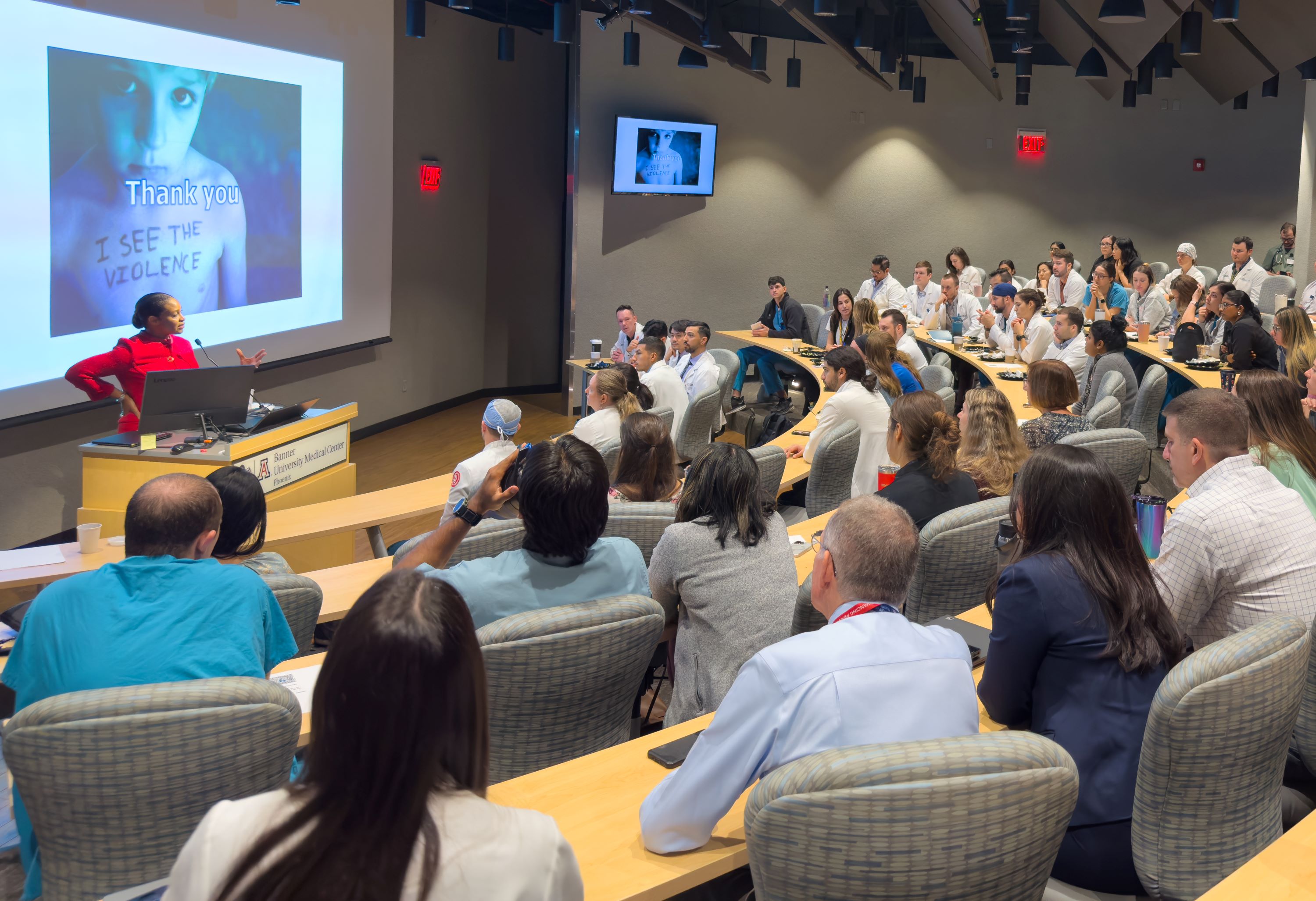
Buffmire Lecture Sheds Light on Intimate Partner Violence

Phoenix, Arizona – Understanding the impact of intimate partner violence (IPV) and recognizing it as a public health concern is the role of every clinician, according to D’Andrea Joseph, MD, FACS, FCCM.
She visited the University of Arizona College of Medicine – Phoenix as the Buffmire Lecture Series speaker and hosted a series of discussions about trauma-informed care for patients who may have experienced intimate partner violence (IPV).
Dr. Joseph defined trauma-informed care as the framework for helping people who have experienced trauma or negative consequences from dangerous experiences. It is a set of principles and practices designed to improve the ways professionals can treat those who have been traumatized.
“While I was at the University of Connecticut, we started an internal grant, an injury prevention fellowship, that included looking at IPV and trying to understand the syndrome as it exists,” Dr. Joseph said. “It really is about the social determinants of health and learning what trauma-informed care had to do with people’s health.”
IPV affects people from all socioeconomic backgrounds, age groups and education levels, according to data collected by the U.S. Department of Justice. Dr. Joseph explained the elderly population is largely unrecognized as a group that experiences IPV, although some reports indicate the actual occurrence of elder abuse to be much higher than the reported 3% to 10% due to underreporting and a lack of understanding on the part of the health care provider.
During case-based discussions with clinical faculty and residents across multiple specialties, including OB/GYN, primary care, bariatric surgery, plastic surgery and geriatrics at Banner – University Medical Center Phoenix hospital, Dr. Joseph talked about how to recognize potential signs of IPV and recommended steps to initiate trauma-informed care.
“Once this person has been identified, what are we doing with the perpetrator?” Dr. Joseph said. “That is where advocacy needs to go because the average middle-income person does not want to go to a shelter unless they think that their life is about to end, and they usually don’t realize it until it’s too late.”
Dr. Joseph spoke with the college’s Women in Medicine and Science group to share, as well as the team of Jonathan Lifshitz’s, PhD. Throughout these conversations, physicians affiliated with the college had the opportunity to listen and learn from Dr. Joseph’s experience in trauma-informed health care and IPV.

Their study seeks to uncover the mechanisms that lead to neurodevelopmental disruption in the unborn child and transgenerational effects of IPV suffered by the mother.
“It became apparent that pregnancy is a risk factor for heightened abuse,” Dr. Lifshitz said. “We did a lab study asking the question whether or not biomarkers associated with TBI are present during fetal development.”
Dr. Joseph was the featured speaker for the joint grand rounds and spoke on trauma-informed care. Michael B. Fallon, MD, FACP, professor and chair of the Department of Internal Medicine, introduced Dr. Joseph and praised her expertise on the subject.
“Our goal is to make the impact of this expertise as accessible as possible,” Dr. Fallon said. “Our opportunity to do this at the joint grand rounds, where we bring together departments, services and allied institutions in this goal, is particularly exciting.”
At the presentation, Dr. Joseph discussed how domestic violence is embedded in human folklore and how normalized it is in some societies. Additionally, she described how IPV is not always physical or sexual violence, but it can be emotional violence.
“Sometimes it’s hard for us to really understand how emotional violence can be determined to be part of intimate partner violence, unless we have been subject to it ourselves,” Dr. Joseph said. “I want to mention that we often neglect to recognize that stalking is a form of domestic violence.”
The college, in partnership with the Flinn Foundation, hosts the Buffmire Lecture series to bring national leaders in the science and art of medicine to Arizona to share their expertise with students, residents, clinicians, faculty and partners to improve health care for the communities we serve.
The lecture is named for Donald K. Buffmire, MD, in recognition of his distinguished career as a medical practitioner in Arizona and his leadership role with the Flinn Foundation in supporting the U of A College of Medicine – Phoenix.
About the College
Founded in 2007, the University of Arizona College of Medicine – Phoenix inspires and trains exemplary physicians, scientists and leaders to advance its core missions in education, research, clinical care and service to communities across Arizona. The college’s strength lies in our collaborations and partnerships with clinical affiliates, community organizations and industry sponsors. With our primary affiliate, Banner Health, we are recognized as the premier academic medical center in Phoenix. As an anchor institution of the Phoenix Bioscience Core, the college is home to signature research programs in neurosciences, cardiopulmonary diseases, immunology, informatics and metabolism. These focus areas uniquely position us to drive biomedical research and bolster economic development in the region.
As an urban institution with strong roots in rural and tribal health, the college has graduated more than 1,000 physicians and matriculates 130 students each year. Greater than 60% of matriculating students are from Arizona and many continue training at our GME sponsored residency programs, ultimately pursuing local academic and community-based opportunities. While our traditional four-year program continues to thrive, we will launch our recently approved accelerated three-year medical student curriculum with exclusive focus on primary care. This program is designed to further enhance workforce retention needs across Arizona.
The college has embarked on our strategic plan for 2025 to 2030. Learn more.